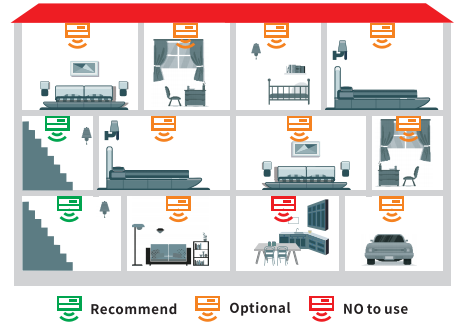High Effective Sensor Alarm for Home Security
Description
The product is photoelectric Smoke Alarm, it is generally more effective at detecting smoldering fires which smolder for hours before bursting into flame.Sources of it fires may include cigarettes burning in couches or bedding. It accords with the ISO/LPCB Standard.
To insure your safety, you need install one alarm at least in your every single room.
How to test the Smoke Alarm:
1) It is important to test this unit monthly to make sure it is working properly. Don’t use fire to test your alarms, press the test button on the cover of the unit until the alarm sounds. If it does not alarm, make sure that the unit is receiving power and test it again. If it still does not alarm, check your battery or replace it immediately.
2) The signal flashes once every 30 seconds and while it alarms the signal will flash once 0.5 per second.
3) If the alarm makes low “chirp” sounds about every 30 seconds, it tells you to exchange your battery.
4) Little smoke will not cause alarms, so misinformation occurs only when you blow smoke to the alarms directly or you forget to turn on your ventilated facility while you are cooking.
5) Sometimes when you smoke the unit will alarm, so you can just ventilate air to it to stop alarming.
Product Description
•1 year battery life time
•DC 9V battery operated
•Photoelectric chamber of early detection from all directions.
•Loud>85db(A)alarm signal(3M)
•Flash alarm indicator(red LED)
•Test/Hush associative button
•Low Battery signal
•Replaceable battery 1Y/3Y/5Y
• N.W.: ≈ 124g(include battery)
• Dimensions: Ф100*37mm
Product Parameter
Model No.
LZ-1901
Standard
EN14604:2005/AC:2008
Voltage
DC 9V
Standby current
≤10uA
Alarm current
≤30mA
Sensor type
Photoelectric
Temperature
0°C~+40°C
Ambient Humidity
≤95%R.H
Alarm indication
Red LED & Buzzer
Sound pressure
≥85dB(around 3m)
Weight
≈126g(incl.battery)
Product size
Φ100*37mm
Installation way
Ceiling mounting
Applicable place

Where not fit to install smoke detector?
1. Where combustion particles are produced. Combustion particles form when something burns. Avoid installing in the areas include poorly ventilated kitchens,garages,and furnace rooms.Keep units at least 6m from the sources of combustion particles(stove,furnace,water heater,space heater)if possible.Ventilate these areas as much as possible.
2. In air streams near kitchens.Air currents can draw cooking smoke into the sensing chamber of a smoke alarm near the kitchen.
3. In very damp,humid or steamy areas,or directly near bathrooms with showers.Keep units at least 3m away from showers saunas,etc.
4. Where the temperatures are regularly below 40 F(4 C)or above 100F(38 C),including unheated buildings,outdoor rooms,porches,or unfinished attics or basements.
5. In very dusty,dirty,or greasy areas.Don’t install a smoke alarm directly over the stove or range.Clean a laundry room unit frequently to keep it free of dust or lint.
6. Near fresh air vents,ceiling fans,or in very drafty areas.Drafts can blow smoke away from the unit,preventing it from reaching the sensing chamber.
7. In insect infested areas.Insects can clog openings to the sensing chamber and cause unwanted alarms.
8. Less than 305mm away from fluorescent lights.Electrical “noise” can interfere with the sensor.
9. In “dead air” space, for example,in Diagram 1,near the corner less than 10cm.
10. If you have a smoking meeting room, don’t install the alarm there for the unit will alarm when several persons smoke.
${currentPro.title}

















